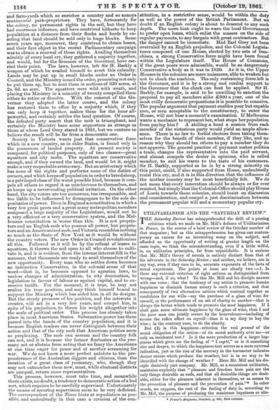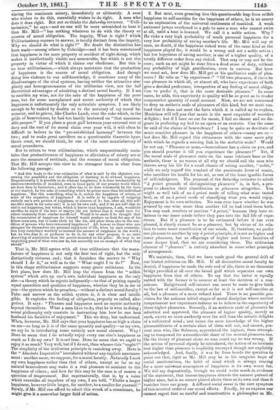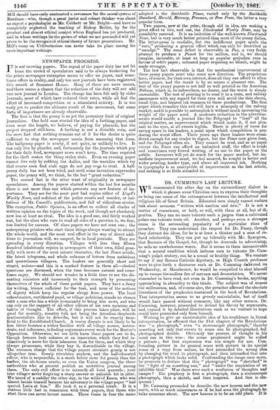UTILITARIANISM AND THE "SATURDAY REVIEW." THE Saturday Review has misapprehended
the drift of a passing criticism which we made on Mr. Mill's defence of Utilitarianism in _Fraser, in the course of a brief review of the October number of that magazine ; but as this misapprehension has given our contem- porary an excuse for an interesting essay on the subject, and afforded us the opportunity of writing at greater length on the same topic, we think the misunderstanding, even if a little' wilful, is, on utilitarian principles, far from unjustifiable. It is curious that Mr. Mill's theory of morals is entirely distinct from that of his advocate in the Saturday Review; and neither, we believe, are in any way, even if they care to be, accurate exponents of the facts of moral experience. The points at issue are clearly two :-1. Is there any external criterion of right actions as distinguished from wrong—and, if so, what ? To this Mr. Mill and his disciple answer with one voice : that the tendency of any action to promote human happiness or diminish human misery is such a criterion, and that consequently of two alternative actions which contend together as candidates for our wills—say the purchase of a glass of wine for oneself, or the performance of an act of charity to another—that is always the better which tends to promote the most happiness. If I shall gain more ultimate happiness by the glass of wine, than I and the poor man can jointly secure by the benevolence—including of course the reflex effect on myself—then it is my duty to buy the wine ; in the contrary case, to do the charity.
But (2) is this happiness - criterion the real ground of the moral obligation of the action—of its moral authority over me—or only an incidental test ? Is it the mere production of a larger hap- piness which gives me the feeling of " I ought," or is it something else and deeper, to which the happiness-test serves as a mere external indication, just as the rise of the mercury in the barometer indicates deeper causes which produce fine weather, but is in no way to be identified with the change of weather ? Here Mr. Mill and his dis- ciple decisively part company. Mr. Mill, as a consistent utilitarian, maintains explicitly that " pleasure and freedom from pain are the only things desirable as ends, and that all desirable things are desir- able, either for the pleasure inherent in themselves, or as means to the promotion of pleasure and the prevention of pain."• In other words, we suppose, the root of the feeling of duty is, according to Mr. Mill, the purpose of producing the maximum happiness or alle-
• Fraur's Magasine, October, p. 395, Iltut column.
liming the maximum misery, immediately or ultimately. A man who wishes to do this, essentially wishes to do right. A man who does it does right. But not so thinks the Saturday reviewer. "Utili- tarianism," he says—and no one will be more astonished to hear it than Mr. Mill—" has nothing whatever to do with the theory or sources of moral obligation. The inquiry, What is right ? which Utilitarianismp roposes to answer, is totally distinct from the inquiry, Why we should do what is right ?" No doubt the distinction has been made—among others by Coleridge—and it has been maintained that happiness is the mere property or accident of right-doing, which makes it intellectually visible and measurable, but which is not the property in virtue of which it claims our obedience. But this is no true utilitarianism,—which always maintains that the production of happiness is the source of moral obligation. And though doing less violence to our self-knowledge, it combines many of the disadvantages of the rival systems, having neither the attractive sim- plicity and homogeneousness of the utilitarian view, nor the full theoretical advantages of admitting a distinct moral faculty. If I am to sacrifice my wine, not for the sake of the happiness of the poor man, but for some unexplained and secret authority of which this happiness is unfortunately the only articulate symptom, I am likely enough to be racked by doubts as to the accuracy of my moral ba- rometer, and to grieve, like Charles Lamb, over the cake which, in the pride of benevolence, he had too hastily bestowed on "that unseason- able pauper." If you place a great gulf between your external test of duty and the root of its moral claim over your will, it will often be difficult to believe in the "pre-established harmony" between the two ; and to make great sacrifices on a questionable theoretic hypo- thesis must, we should think, be one of the most unsatisfactory of moral procedures.
But -to return to true utilitarianism, which unquestionably main- tains that productiveness of happiness or alleviation of misery are at once the measure of rectitude, and the essence of moral obligation. That Mr. Mill accepts this view in its strongest form is clear from the following passage:
" And this leads to the true estimation of what is said by the objectors con- cerning the possibility and the obligation of learning to do without happiness. Unquestionably it is possible to do without happiness; it is done involuntarily by nineteen-twentieths of mankind, even in those parts of our present world which are least deep in barbarism ; and it often has to be done voluntarily by the hero or the martyr, for the sake of something which he prizes more than his individual happiness. But this something, what is it, unless the happiness of others, or some of the requisites of happiness? It is noble to be capable of resigning entirely one's own portion of happiness, or chances of it: but, after all, this self- sacrifice must be for some end; it is not its own end; and if we are told that its end is not happiness, but virtue, which is better than happiness, I ask, would the sacrifice be made if the hero or martyr did not believe that it would earn for others immunity from similar sacrifices? Would it be made if he thought that his renunciation of happiness for himself would produce no fruit for any of his fellow-creatures, but to make their lot like his, and place them also in the con- dition of persons who have renounced happiness? All honour to those who can abnegate for themselves the personal enjoyment of life, when by such renuncia- tion they contribute worthily to increase the amount of happiness in the world ; but he who does it, or professes to do it, for any other purpose, is no more deserving of admiration than the ascetic mounted on his pillar. He may be an inspiriting proof of what men can do, but assuredly not an example of what they should."
That is, Mr. Mill agrees with all true utilitarians that the manu- facture of happiness is not only the best test of right, but the only distinctively virtuous end; that it furnishes the answer to "Why should I do it," as well as to the " What ought I to do ?" Now, in this shape utilitarianism suggests many grave criticisms. In the first place, how does Mr. Mill leap the chasm from the " selfish system" which sets up one's own individual happiness as the only aim—a theory which he rejects indignantly—to that of prizing equally equal quantities and qualities of happiness, whether they be in me or you—the system which he preaches,—without a distinct moral faculty ? False and narrow as the selfish system is, it is clear and intelli- gible. It explodes the feeling of obligation, properly so called, alto- gether. It says : " Pleasure and happiness need no mystic authority beyond themselves. What a man likes to do, that he is wise in doing ; moral philosophy only consists in instructing him how he can best husband his faculties of enjoyment." This we deny, but understand. When, however, Mr. Mill says that your happiness has as high a claim on me—so long as it is of the same quantity and quality—as my own, we say he is introducing some entirely new moral element. Why ? Does he mean that I do actually enjoy every one else's happiness as much as I do my own? It is not true. Does he mean that we ought to enjoy it as mach? Very well, but if I do not, then whence this "ought?" The simplicity of the utilitarian principle is vanishing away. Here is the " Absolute Imperative" introduced without any explicit announce- ment: another name, we suppose, for a moral faculty. Naturally I seek my own happiness rather than that of others, except so far as my natural benevolence may make it a real pleasure to minister to the happiness of others ; and how far this may be the case is of course a question of temperament. But supernaturally, that is, by a voice which overrides all impulses of my own, I am told, "Prefer a larger happiness, however little larger, for another, to a smaller for yourself." Surely, if Mr. Mill can afford to admit this wreck of a conscience, he might give it a somewhat larger field of action. 2. But next, even granting him this questionable leap from selfish happiness to self-sacrifice for the happiness of others, he is no nearer to an explanation of the universal sentiments of mankind. A weak swimmer jumps overboard in a gale to save a man who cannot swim at. all, until a boat is lowered. We call it a noble action. Why ? He risks a very high probability of much personal happiness for a very low probability of saving another's life. Mr. Mill will say at once, no doubt, if the happiness risked were of the same kind as the happiness played for, it would be a wrong and not a noble action ; but the happiness of saving another, is one of a higher quality, of a totally different order from any risked. That may or may not be the case; such an act might be done from a dead sense of duty, without any probability of high gratification, even in success. But here we must ask, how does Mr. Mill get at his qualitative scale of plea- sures ? He tells us " by experience :" " Of two pleasures, if there be one pleasure to which all, or almost all, who have experience of both give a decided preference, irrespective of any feeling of moral obliga- tion to prefer it, that is the more desirable pleasure." In some cases, he adds, this superiority in quality will be so great as to render comparative quantity of small account. Now, we are not concerned to deny an msthetic scale of pleasures of this kind, but we must con- tend that it does not meet the facts which it is called up to explain. Musicians will tell you that music is the most exquisite of sensitive delights ; but if I have no ear for music, I feel no shame and no dis- grace in preferring my bed to an opera or an oratorio. Can the same be said of the claims of benevolence? I may be quite as destitute of acute sensitive pleasure in the happiness of others—many are so— but does Mr. Mill regard this obtuseness with the same mere pity with which he regards a missing link in the msthetic scale? Would he not say, "Pleasure or none,—benevolence has a claim on you, and you should practise it till you experience the pleasure ?" Yet, if the moral scale of pleasures rests on the same intrinsic base as the msthetic, there is no reason at all why we should call the man who throws away his life for a small chance of saving another, "noble," while we only regard' the conduct of the passionate lover of music, who sacrifices his health for his art, as one of the least ignoble forma of self-indulgence. The proposal of the Saturday reviewer to admit "a priori grounds of distinguishing pleasures" is, in fact, a pro- posal to abandon their classification as pleasures altogether. You might as well talk of an a priori mode of telling what wine tasted, best, as of an a priori mode of classifying what you would enjoy. Enjoyment is its own criterion. No man ever knew whether he was pleased by one wine more than another till lie had tried them both. You may rank resolves or motives " a priori," because they have re- lations to our inner minds before they pass into the full life of expe- rience. But if a pleasure is to be estimated before it has ever pleased, it clearly cannot be as a pleasure, but by virtue of its rela- tion to some inner constitution of our minds. If, therefore, we prefer one pleasure to another by any a priori principle, it is not as higher and lower pleasures, bat as offsprings of higher and lower faculties of some deeper kind, that we are considering them. The utilitarian element of "pleasure" is entirely absorbed in some other principle of arrangement.
We maintain, then, that we have made good the general drift of our hinted criticism on Mr. Mill. If all distinctive moral faculty be denied, if happiness be made the sole end of life, there is no theoretic bridge provided at all over the broad gulf which separates our own happiness from that of others. To say that the latter is equally sacred with the former is to assume at least the skeleton of a con- science. Enlightened self-interest can never be made to give birth to the law of self-sacrifice, except so far as it is not self-sacrifice at all, but a pleasure of a more refined kind. There is no possible pro- vision for the arduous initial stages of moral discipline where neither temperament nor experience induces us to believe in the superiority of these higher pleasures. Secondly, if an msthetic scale of pleasures be admitted and approved, the pleasure of higher quality, merely as such, exerts no more authority over the will than the artistic delights, of a cultivated mind ; and hence the mere knowledge of the higher pleasurableness of a certain class of them will not, and cannot, pre- vent men who, like Solomon, appreciated the highest, from attempt- ing to compound for a considerable share of the sensual pleasures too. On the theory of pleasure alone no man could say he was wrong. If the notion of personal dignity be introduced, the notion of an intrinsic test higher than pleasure is implicitly conveyed though not explicitly acknowledged. And, finally, it was far from beside the question to point out that, right as Mr. Mill may be in his sanguine hope of social ameliorations, the habit of mind which is always craving for a more universal atmosphere of happiness is its own worst foe. Vire will say dogmatically, though we could write much in evidence of the statement, that human happiness attends the earnest pursuit of higher aims, but is no sooner placed above them as its own end than it vanishes from our grasp. A diffused social ennui is the sure symptom of this inverted order of our moral efforts. Filially, let us express one earnest regret that so careful and constructive a philosopher as Mr.: Mill should have early matinee: a reverence for the moral: system of Bentham—who, though a great jurist and robust thinker was about as expert a psychologist as Mr. Cobbett or Mr. Bright—and have so completely neglected the teaching of Bishop Butler, by far the greatest and closest ethical analyst whom England has yet produced, and in whose writings lie the germs of what we are persuaded will yet prove to be the recognized ethical theory of future generations. Mr. Mill's essay on Utilitarianism can never take its place among his more important writings.
































 Previous page
Previous page